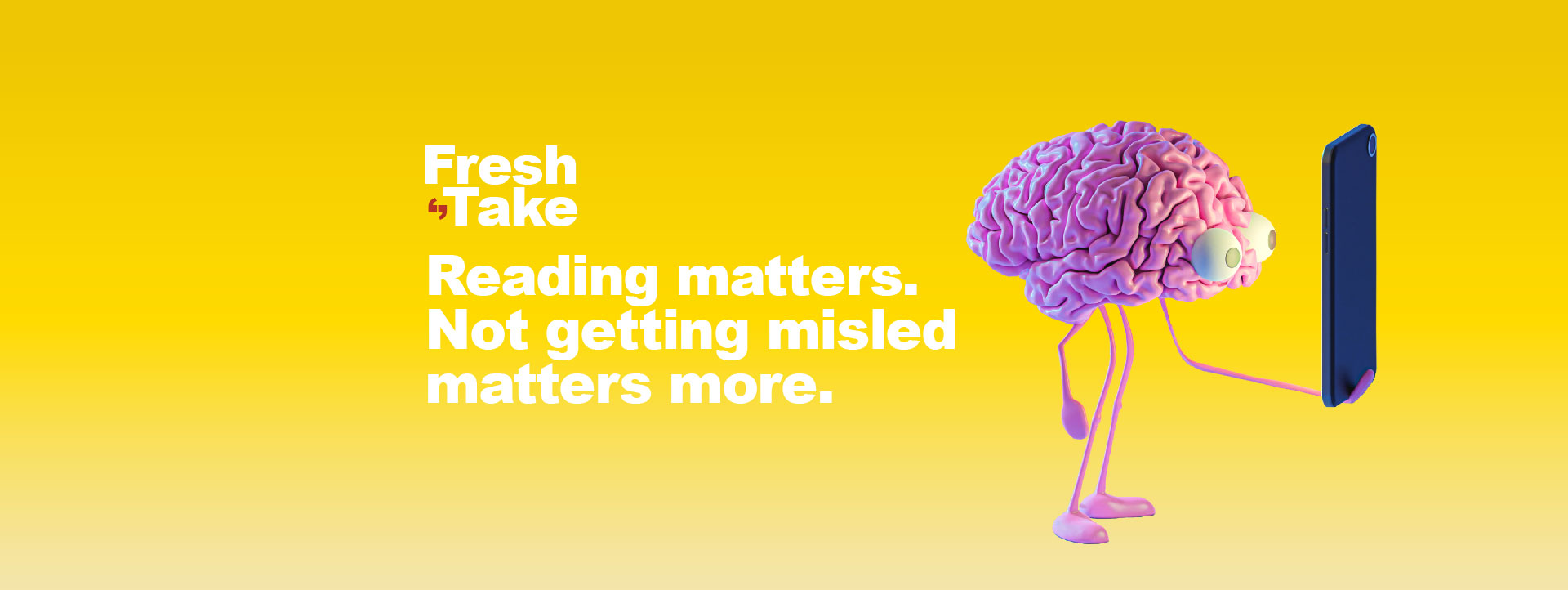Today, we live our lives surrounded by news. It’s on every form of social
media you can think of, shared by everyone you follow. How much of it is
accurate, balanced and fair? More importantly, how can you identify fake
news and the truth?
Here’s our fresh take on this: Information is notoriously hard to filter. What
we believe is this: reading and understanding critically is a skill that needs
to be constantly sharpened. Here, we cover a few things to be aware of.
Information 'bubbles'
and how to avoid them
Information can create a ‘bubble’ around us which distorts our
perception of reality. In recent years, these bubbles have become a
significant problem, and appear to be getting worse.

If you tend to search for certain
types of news, the internet and its
machine learning systems will
deliver more of it. Eventually, it will
appear as if everything you see on
the internet totally agrees with you
and your views.
Comments on social media (even from ‘proper’ news sources) and chain
messages that spread on instant messaging platforms are the same. As a
general guide, anything that overly relies on emotion is likely to be short
on facts or has distorted the facts substantially, rendering the information
inaccurate and unreliable.
Bias is the problem,
and all of us have some:
Bias distorts the meaning of what we read. It’s a natural human
tendency, to interpret what we read against what we know (or believe to
know). There’s no way to eradicate bias, but there’s a great benefit in
recognising when it is acting up.
The two most common types of bias are:
Confirmation Bias
We tend to favour information that
confirms what we believe or want
to believe. For example, a stock
owner tends to focus on positive
news about the stock and the
economy — and ignores negative
information.
It’s human nature to not want
to be wrong. Confirmation bias
makes it difficult to see and hear
the news objectively
Political Bias:
Some media sources lean towards
a particular political angle - be
careful of relying only on a single
source. Be wary of news sources
that provide stories that seem
incomplete or just appear to be
propaganda.
Always take it with a pinch of
salt. Familiarise yourself with the
political spectrum of the countries
you’re investing in.

Three Questions to Ask When Reading an Article:
1. Is the article based on data or opinion?
2. Is it descriptive of past conditions or predictive of the future?
3. Does the article have a testable hypothesis?
Adapted from Robert J. Martorana (CFA Institute)
‘Simple strategies for
better decision making:
Trust Algorithms
An algorithm is just a rule that can
be as simple as you want it to be –
they tend to outperform people in
making predicative judgments.
Also, numbers and charts speak
louder than words, so focus on
what they’re trying to tell you.
Take the broad view
Don’t view each problem or input
(e.g., historical experience,
financial theory, forward-looking
indicators, current market
conditions) in isolation. Take a
broad perspective that includes
every factor and integrates them
into a coherent story you can
understand.
Test for regret
Test for regret If there’s potential for regret, you
are likely to make poor decisions,
such as stubbornly holding a stock
that’s going down in hopes that
it’ll rebound. Always assess your
risk tolerance, set stop losses and
have the discipline to follow
through.
Seek out good advice
Cognitive biases create blind spots,
so seek out advice and guidance
from trusted sources.
Learn to harness the power of
insight and criticism from people
with integrity
by Nobel laureate Daniel Kahneman at the 71st CFA Institute Annual Conference
An observation of human nature:
“When the market goes down,
we take info from the pile
that justifies the negative.
When the market goes up,
we take from the pile
that justifies the positive,"
Bank of America Vice Chairman Keith Banks
Learn to read critically;
your success depends on it
Learning to filter, compare and think critically is a survival skill:
In the information age, any information can be found almost instantly.
Anyone can publish almost anything, and they often do. Spotting the
difference between an outright scam, a misleading article and the truth
separates a potentially successful investor from one that may lose a great
deal of money.
Get your daily doses of news from multiple trusted sources:
Having more than one source is important as it helps give you a well
rounded view. As all investors like to say: diversifying helps spread risk. It
is only ever possible to con someone who doesn’t know better. The only
way to gain knowledge about anything is to read as widely as you can,
and beware of your own built-in biases. So stay calm, and read on!
This article is part of Hong Leong Bank’s educational series, called ‘Fresh Take’.
Here, we seek to present you a fresh, unbiased perspective of all matters financial.
We’ll be uploading more educational content moving forward, so do watch out for
the next piece.
In a world that’s awash with information that may be either true, false or
anywhere in between, Fresh Take aims to cut through the clutter, and help you on
your journey as an investor who’s seeking to build a strong financial future.
Please reach out if you need to know more,
or need personalised help
